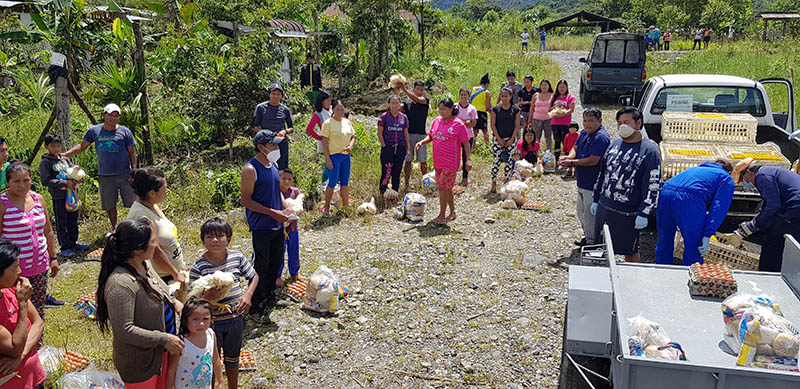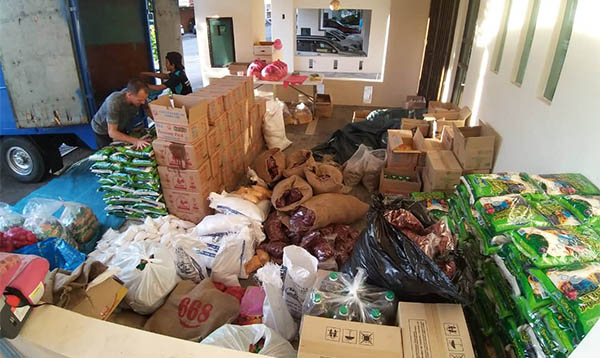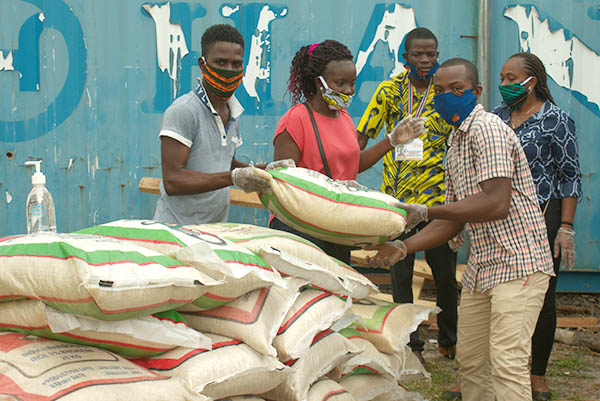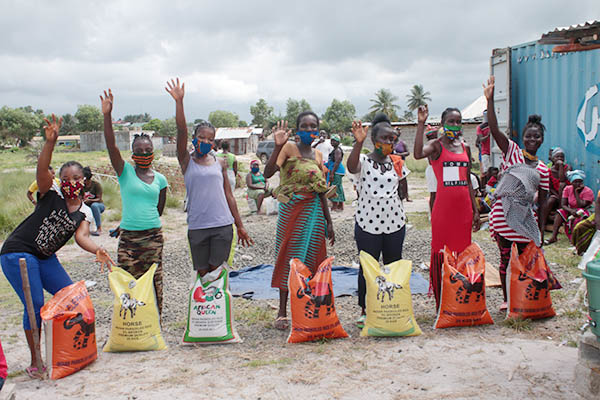HOW GOD IS USING US DURING COVID-19
As an international ministry of regional teams, travel is a big part of what we do. But what happens when a global pandemic causes all travel to halt? When COVID-19 hit, we had questions about how it would affect the work we do. Would we be able to do the 60+ projects we had in the works? Would our missionaries be able to stay and serve in their communities, or would they have to return to the United States? Would isolated unreached people groups feel more isolated?
On the contrary, God is able to use even a pandemic to create more connection and more opportunities for sharing the Gospel. “Taking away the option to travel makes us focus on the other things we can do—the other strengths we have that sometimes get neglected,” said Alex, Regional Director of the Sub-Saharan Africa region.
One of the benefits of being a missionary-sending agency is that we have teams on the ground living and serving among unreached people groups. We don’t have to travel to find opportunities. Because our teams chose to stay on the ground during the pandemic when they had the option to leave, the unreached people in their community were able to see the love of Jesus demonstrated for them.
 ECUADOR
ECUADOR
COVID-19 arrived first on the coast of Ecuador and then spread throughout the country. Public transportation was suspended, so people could not get to work. The economic impact has been devastating.
Providing support to the community during a crisis isn’t new for Reach Beyond, or HCJB, in Ecuador. However, over the years, there has been a shift in how we provide that support. As the Ecuadorian Church has grown, we have focused on empowering the Church so as not to create an unhealthy dependency. This is one of the goals of the newly formed Voz y Manos (Voice and Hands) entity.
“For years, Ecuadorians just saw the mission (HCJB/Reach Beyond) doing everything,” says Vinicio Salazar, a Reach Beyond missionary from Ecuador, whose parents were longtime employees at Hospital Vozandes del Oriente in Shell. “We are trying to empower the Church in Ecuador so that people see the Church as the source of help. I know we can help, but it is important that Ecuadorians see themselves as the helpers – brown faces, not just white faces.”
With that in mind, the response to COVID-19 in Ecuador has been from the posture of supporting the Church in reaching out to the community. In Shell, Vinicio reached out to his pastor and got a list of people who really needed food. Between the church and Voz y Manos, they bought and delivered supplies, under the church’s name. They organized the purchase of food bags, fresh eggs and live chickens to distribute to those most affected by the loss of work. After the first two deliveries, others in the church, who had a bit more to give, began asking if they could also help. The project has grown to include nine churches in Shell and the surrounding communities.
“It’s been inspiring to see the community stepping up, and for the local church to be the Hands of Jesus during a hard time,” says Vinicio.
ASIA PACIFIC
On the other side of the world, the COVID-19 lockdown in an undisclosed Southeast Asian country has been especially hard on migrant workers. Thousands of migrants from one people group were working in construction and various labor jobs in the informal sector, but with lockdown, they were the first to be laid off. They have no safety net for times like this, and without work, they are unable to feed their families. Even government support has left them out. There has been an increase in hate and discrimination against this people group, as the country tries to place blame for how the pandemic was brought in.
 A couple of our missionaries joined together with other like-minded organizations to think up ways to serve these unreached people in their community even before the pandemic. The team had started weekly English classes and we were beginning home visits to reach out to women.
A couple of our missionaries joined together with other like-minded organizations to think up ways to serve these unreached people in their community even before the pandemic. The team had started weekly English classes and we were beginning home visits to reach out to women.
When COVID-19 lockdowns began, the inter-agency team wanted to do more. They were able to identify 70 families initially from those they had already begun working with, who were out of work and in need of help. They began giving each family unit (4-5 people) food staple packages, hygiene items, such as facemasks and sanitizer, and a small cash amount to help with expenses, once a week. Through donations from several individuals and organizations, including Reach Beyond, the team was able to expand the distribution to 188 families over a 12-week period. They also did two mass distributions at construction sites. In total, the team was able to reach 2,772 unique units (singles or families) at least once, delivering 3,059 bags of food.
“We delivered so much food, one team leader actually blew the suspension out of their van trying to carry too much,” shared Rachel, a new Reach Beyond missionary and nurse who joined our Asia Pacific team earlier this year. She was one of five units who received permission from the government to make these deliveries each week. On June 14, the deliveries ended, just as the strict lockdown lifted and families could return to work. But that doesn’t mean the relationships will end.
“Before COVID-19, we were providing education, mostly just to young guys coming to the center to learn English. But with the food distribution, we’ve built relationships with the whole family. We’ve gained trust. We are now invited into their homes,” said Rachel.
Instead of slowing down the work with these unreached people, the pandemic actually accelerated the work and opened new doors. Rachel was only meeting with one woman before the pandemic. Without having met the husbands, she wasn’t invited into homes to be able to build relationships. But, when the husbands were laid off and food deliveries began, Rachel was able to meet them and gain their trust.
“When we showed up with food every week, they’d ask us why. We could say we are Christians, and that we didn’t pay for the food, but Christians from all over the world who love them provided the money,” Rachel said. “They saw the difference between how we supported them, versus how the Muslim country was treating them. As a display of God’s love in their time of need, the food distribution has built trust and opened doors for future ministry.”
CENTRAL ASIA
Our medical team serving in Central Asia is not only seeing patients, but also helping the local Church feed their neighbors. Lockdowns in the country started towards the end of March, and within weeks, the team began receiving requests to help those who had run out of food. Like other regions, many families live paycheck-to-paycheck buying food as they need it, rather than storing it up. The government reported that there were over 339,000 families in need of food.
As with any community development project, the team started by working alongside community partners. They reached out to seven churches and one non-governmental organization, located in areas where we had previously completed medical outreaches. Each partner provided a list of families in need of food and medical supplies. The distribution was tricky, but they ended up having five drivers with passes to travel around the city and the surrounding area. The first time they delivered over 8,300 pounds of food to a total of 90 families.
When the quarantine was extended, they decided to partner again with the local Church. This time, however, the lockdown had relaxed enough that they were able to fully involve local churches. The local missions pastors and churches decided they wanted to help needy families who were not believers. Again, they made a list of 150 needy families they knew within their sphere. Our team received a lot of help from local believers who were free to leave their home and help sort, buy and deliver the food products. The food was then delivered to the local churches who then delivered the food to the needy families. Not only did they deliver over 10,500 pounds of food, but they also gave families a New Testament and other Christian literature.
One family shared with us that they had to leave the main city when the pandemic hit—they could no longer afford the apartment they were renting for their family of nine. The father of the family couldn’t work during the quarantine, but he had skills, so he offered to help an elderly grandmother make repairs on her home. The grandmother didn’t have money to pay him, and he said that was ok—he just wanted to give from his heart. Impressed, the grandmother told him his blessing wouldn’t go unnoticed and that God would surely bless him. His family was out of food, but the next day, our food delivery arrived and blessed this special family.
One of our doctors shared, “We love these types of projects—the opportunity to work with local believers to reach their own people. I have been told many times that to be successful as a missionary worker, you must be flexible. Living and working in a closed country, you must be creative in making an impact.” Whether it is through medicine, or through food distribution, God can use whatever we have to give to impact His kingdom. SUB-SAHARAN AFRICA
SUB-SAHARAN AFRICA
In some parts of the world, we are coming alongside the local Church to be a blessing to unreached people. In other parts, we come alongside our partner radio stations to be a blessing to the local Church.
“COVID-19 came with lots of challenges. Global lockdown and social distancing meant churches are no longer meeting,” says Joseph Kebbie, a Reach Beyond missionary and Liberian national who works alongside radio stations throughout the Sub-Saharan Africa region. “We are now seeing radio—the most powerful tool we have in this region being used by pastors to speak to their church members. God is at work even during this time.”
This new collaboration between local churches and radio stations didn’t come without challenges. “We knew pastors would be using radio for the first time,” said Regional Director Alex. “Africans love to talk. However, speaking to a listener through a radio is a completely different ballgame from preaching in a church. Radio gives pastors a much wider audience than they are used to.”
To help with this, Reach Beyond missionaries put together an 8-minute training video that highlights practical tips to help pastors engage listeners and use the medium well. It was recorded in English and translated into French and Portuguese, to give it the widest audience possible. The video was sent to 600 individuals and organizations working in media across Sub-Saharan Africa. As a result of the training, pastors are staying connected to their congregations and giving communities hope.
 However, the support did not end there. Knowing that people were hurting, out of work and hungry, Reach Beyond also partnered with radio stations to provide food.
However, the support did not end there. Knowing that people were hurting, out of work and hungry, Reach Beyond also partnered with radio stations to provide food.
“Radio is just words. Put those words into action, and they have far more meaning,” says Joseph. “We need to get up and go into the community and showcase what Jesus did. He didn’t only talk. He fed the poor and healed the sick.”
In communities throughout the region, radio stations identified people that were desperate, and they helped those people. We provided support, but the stations determined how aid was to be used.
Joseph grew up in Africa as a PK (pastor kid), and he saw how his family gave and gave to the community, but nobody was there to take care of them. It made him ask the question, “Who takes care of the shepherd?”
Three of the radio stations Joseph works with in West Africa decided to take this on. They jumped in to provide food and support for the pastors in the area, many of whom were struggling. “This was something that never happened before,” Joseph said. “Pastors see that support and are now saying moving forward, this is their station and they will support it in return. This is vital. God gave the community this station, and now they can come together as one body to support it, to evangelize, love and support their community.”
Through these efforts, new bridges are being built between radio stations and churches that will ultimately result in more unreached people hearing about Christ. Alex says, “Being in lockdown is restrictive, but we are grateful that the situation we are in causes us to think outside the box, and causes our partners to think outside the box, as well.”
|
GIVE: GO: PRAY: |
